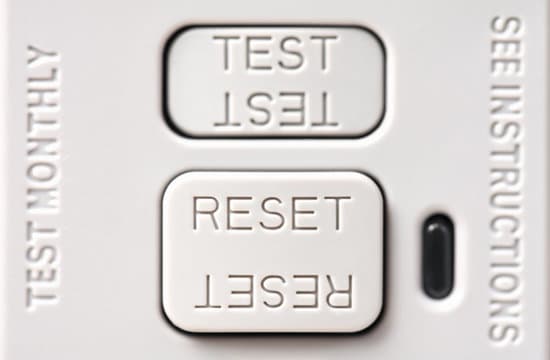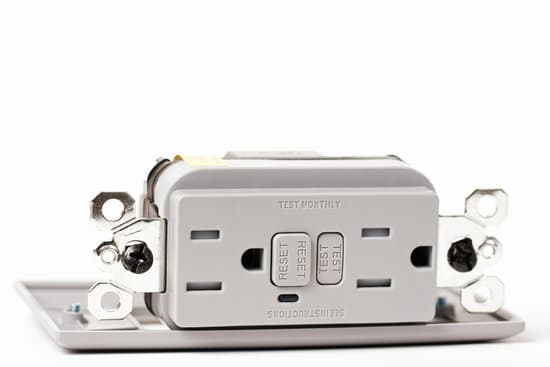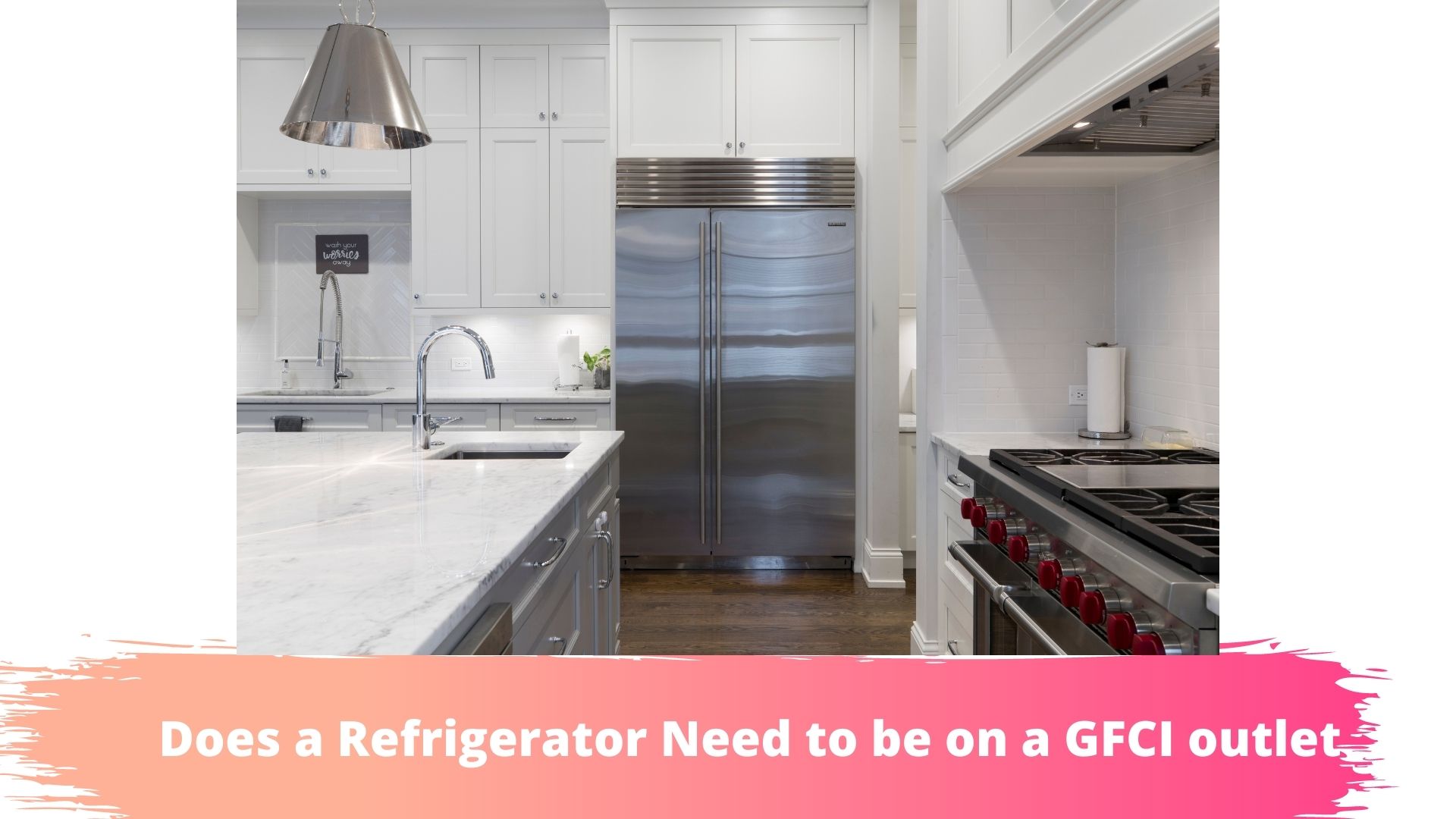GFCIs were designed to save lives by preventing electrocutions and fires. The people at Henderson Engineers believe that GFCI technology has averted several disasters since the NEC adopted it in 1971. So, does a refrigerator need a GFCI?
A refrigerator doesn’t need a GFCI. You can plug the appliance into a GFCI outlet if you think that the situation calls for one. For instance, if the refrigerator is located in a place with a lot of moisture and water, a GFCI outlet will protect you and your family from electrical shocks.
In that regard, it seems logical to plug refrigerators into GFCI outlets. After all, even if you don’t have any reason to worry about potential electrocutions and fires, you don’t lose anything by pairing refrigerators with GFCI outlets.
Isn’t it better to be safe than sorry? Yes, it is. However, for many people, GFCI outlets are a pain because refrigerators have a reputation for tripping them.
And you won’t even know that your GFCI outlet has tripped, which means that all your food could spoil because you did not realize that your refrigerator was no longer plugged into an operational outlet.
For many homeowners, it is so much easier to leave their refrigerator in an ordinary outlet. But is this safe? Better yet, is this allowed? Keep reading if you want to know the answers to those questions.
What is a GFCI Outlet?

A GFCI outlet looks a lot like an ordinary outlet. But it has a ‘Test’ and ‘Reset’ button on its body. The device is designed to respond to ground faults. If the term is new to you, ‘Ground Fault‘ refers to a situation where electricity strays from its pre-determined path.
Current is supposed to flow through wires to a particular destination. But if you introduce a new conductor such as water or the human body, the current may deviate, running through the new conductor and causing serious harm.
GFCI outlets have sensors that observe the outgoing and returning current. When the electricity strays from its path, the resulting surge causes an imbalance in the current between the phase conductor and neutral return, an anomaly that the GFCI technology notes and resolves by cutting power to the outlet.
Circuit breakers are supposed to trip in the event of an overload. However, they still permit electrocutions to occur. A GFCI outlet, on the other hand, shuts the power to the outlet down so quickly that it doesn’t allow enough current to run through your body to cause significant harm.
Does a Refrigerator Need a GFCI?
No, a refrigerator doesn’t need a GFCI. You can plug the appliance into a GFCI outlet if you think that the situation calls for one. For instance, if the refrigerator is located in a place with a lot of moisture and water, a GFCI outlet will protect you and your family from electrical shocks.
However, if water and moisture are not an issue, your refrigerator can get by without a GFCI outlet. If you have doubts about this issue, talk to an electrician. They will investigate your home. If they identify any hazards that make the GFCI outlet necessary, they will inform you. Otherwise, if your refrigerator isn’t plugged into a GFCI outlet, it isn’t a problem. You have nothing to worry about.
Is a GFCI Required for a Refrigerator?

What does the law have to say on the issue? Ultimately, if the law decides that your refrigerator requires a GFCI outlet, you must comply. Otherwise, you could attract hefty fines. But does the NEC expect consumers to use GFCI outlets for fridges? This question has two answers:
1). The NEC doesn’t say anything about refrigerators and GFCI outlets. For the moment, they do not expect homeowners to plug refrigerators into GFCI outlets. If you don’t like GFCI outlets because your freezer keeps tripping them, don’t be so quick to celebrate. You have one more consideration to make.
2). The NEC has strict guidelines regarding the application of GFCI outlets. According to Bobvila, they are primarily concerned with locations that expose appliances and outlets to water. This is why Home Depot mentions places like bathrooms and kitchens.
Any appliances installed in those areas could cause ground faults once they come into contact with water. The NEC also mentions basements, crawl spaces, laundry areas, garages, and boathouses, to mention but a few.
Why does this matter? It’s simple. Does the NEC expect homeowners to plug refrigerators into GFCI outlets? No, it does not.
However, if your refrigerator’s receptacle is located within six feet of a sink or bathtub, or if it has been positioned in a garage, outside (under roof eaves), in boathouses, and any other location that exposes the receptacle to water, it needs a GFCI outlet.
A lot of homeowners forget about the location. If you don’t want to use a GFCI outlet with your refrigerator, don’t place the appliance in a location that requires GFCI protection. If you can keep the refrigerator far from water and moisture, the NEC doesn’t care whether or not you use GFCI outlets.
Should a Refrigerator Be On A GFCI Outlet?
A refrigerator doesn’t have to be on a GFCI outlet for you to use it. If the plug has three prongs, make sure you plug it into a three-prong outlet. You are also expected to keep the appliance on a dedicated circuit. You are less likely to overload the circuit.
Naturally, you shouldn’t use power strips, surge protectors, or extension cords. They do not have the capacity to power the fridge.
For the most part, those are the only considerations that matter. You don’t have any reason to use a GFCI outlet. Because the appliance has a high chance of tripping the GFCI circuit, it could spoil your food in the long run.
Stick with a regular outlet unless an electrical technician tells you otherwise.
People do not realize that refrigerators are rigorously tested to ensure that they can operate safely on your home’s circuit. So long as your home was properly wired, you have nothing to worry about.
Of course, as was mentioned before, the location matters. A refrigerator in a damp basement is better off with a GFCI outlet. The same thing goes for a freezer that keeps causing water to pool on the ground. Such situations can lead to fatal accidents.
The National Electric Code was created for this very reason, to ensure that the most dangerous places in your house have GFCI protection. If your refrigerator’s current location isn’t a hazard, a GFCI outlet will only frustrate you.
Can A Refrigerator Cause a GFCI To Trip?
Yes, it can. GFCI technology cuts the power to the outlet whenever it observes an imbalance in the outgoing and returning current.
It is a nuisance. In other words, even though your refrigerator is plugged into the outlet, it won’t be on, which means that your food will go bad.
Thus, this is the most common complaint where refrigerators and GFCI outlets are concerned. In fact, many heavy-duty appliances cause GFCI outlets to trip. This is the primary reason why so many people are hesitant to use GFCI technology with fridges.
Most GFCI outlets do not warn their owners that they have tripped. This makes them very annoying.
What Causes GFCI Outlets to Trip?
Before you can determine the factors causing the refrigerator to trip your GFCI, you need to understand why GFCIs trip in the first place. More than likely, you will identify some of the factors affecting your appliance:
1). Quantity
You can install GFCI technology on every outlet. This is convenient but also expensive because the individual GFCI outlets cost a lot of money. You also have the option of installing GFCI technology on a single outlet in a manner that ensures that all the outlets downstream have GFCI protection.
While the second option is the most inexpensive, it is also irritating because an issue at one outlet can cause all the outlets to shut off. In such a scenario, you can cause a GFCI to trip by attaching too many appliances to the receptacles downstream.
While the GFCI technology can handle the current leakage from one or two receptacles, the cumulative leakage from all the receptacles may cause it to trip.
2). Wiring
Have you inspected your GFCI outlets? If you haven’t, find an electrician to do so. GFCI technology can only protect you if the receptacles and circuits were properly wired. Otherwise, improper wiring can cause frequent and unexplained tripping.
3). Water
Water is the sort of conductor that can cause a ground fault. GFCI receptacles respond to ground faults by tripping. If your GFCI outlets keep tripping, Henderson Engineers encourages you to check the amount of moisture in the area. Sometimes, moisture enters the receptacle box. The box should be dry. Otherwise, tripping will become a regular occurrence.
4). Quality
Some GFCI devices are bad. They have a defective component and nothing you do will stop them from tripping.
Why Would A Refrigerator Trip A GFCI?
Unexplained tripping in your refrigerator’s GFCI receptacle is unacceptable. But you can’t stop it without identifying the causes, which include:
1). Power
Refrigerators do not draw the same amount of current all the time. They have periods during which they require a lot more power. For instance, the appliances use more electricity when the door is open.
GFCIs look for imbalances in the outgoing and returning current. A refrigerator can temporarily pull enough current to cause an imbalance. This will cause the GFCI to trip even though the surge was not only temporary but perfectly safe.
2). Vapor Compressors
If your vapor compression refrigerator has inductive loads, they produce EMI (electromagnetic interference) when switched off. The EMI can cause GFCIs to trip.
3). Icemaker/Defrost Heater
Icemakers and defrost heaters can cause GFCI outlets to trip. Older models don’t have them. But if the functions are present in your fridge, they are probably the cause of the frequent tripping.
4). Damage
Wear and tear can damage the wiring, causing overloading and ground faults to occur.
GFCI outlets have a limited lifespan.
They cannot work forever and they are not immune to harm. If they are damaged or if they wear out, haphazard tripping is a common consequence. This also applies to the refrigerator.
If the appliance has loose or damaged wiring, it will cause the GFCI to trip.
Diagnosing a Refrigerator That Keeps Tripping the GFCI
To fix your tripping GFCI, you have to match the solution to the right cause. That means carefully investigating both the GFCI and the refrigerator:
1). Start by resetting the GFCI. It has a ‘Reset’ button that pops out whenever it trips. Unplug the fridge, push the button back in, re-plug the fridge into the outlet, and wait to see if it trips again. Sometimes these problems solve themselves. If your GFCI receptacle continues to trip, proceed with your troubleshooting.
2). Check the GFCI outlet to see if it is the problem. You can do this by plugging other things into it. If it doesn’t trip, then you can assume that the refrigerator is the primary culprit. If it trips, then the GFCI is the issue.
3). You can further confirm your theory by plugging the refrigerator into a different GFCI outlet. If the new outlet trips, the fridge is definitely the problem. But if the new outlet doesn’t trip, the issues lie with the old GFCI. It might be defective.
4). To narrow things down even further, plug the refrigerator into a normal outlet. If it has a serious defect, it will overload the circuit, causing the breaker to trip.
How Do I Stop My Fridge From Tripping The GFCI Outlet?
If your fridge keeps tripping the GFCI outlet, try one or more of the following solutions:
1). Snubber
If the GFCI keeps tripping because of EMI from an inductive load, you can install a snubber. It sits between the fridge and the GFCI. It will reduce the interference, preventing it from tripping the GFCI.
2). Disable Icemaker/Defrost Heater
While icemakers and defrost heaters are useful and convenient functions, if they keep tripping your GFCI, you are better off disabling them.
3). Hire an Expert
If you believe that loose, damaged, or faulty wiring is responsible for the tripping, hire an expert. They will identify the problem and resolve it. Faulty wiring can produce disastrous results down the line if you fail to resolve it. The tripping GFCI will be the least of your worries.
4). Replace Defective GFCI
If the GFCI outlet is defective, get another one. You can tell that the GFCI is defective by checking whether or not it continues to trip when you plug other appliances into it. If you have had the GFCI outlet for a long time and it has always worked, and the tripping is a recent development, the GFCI outlet is most likely worn out.
According to David Gray Online,
The sensitivity circuitry in a GFCI outlet can wear out over time.
Once that happens, it should be replaced.
5). Reduce Quantity
Reduce the number of appliances the GFCI has to protect on downstream receptacles.
6). Installation
Ask a professional to inspect the GFCI. Make sure it was installed properly.
7). Eliminate Moisture
Eliminate moisture from the vicinity of the refrigerator. If the receptacle box is wet, turn the breaker off and use a blow dryer to dry it. If the receptacle box is in a location with a lot of moisture, weatherproof it.
Conclusion
GFCI outlets protect homeowners from ground faults by switching the power to the outlet off. This prevents electrocutions and fires.
However, even though GFCI outlets protect people, you don’t have to plug a refrigerator into one. A fridge will most likely cause a GFCI outlet to trip, spoiling your food. Fridges will trip GFCI outlets for any number of reasons.
Sometimes, the circuit is simply overwhelmed by the appliances the GFCI is protecting downstream. Other times, you have loose, damaged, or shoddy wiring. In some cases, the GFCI technology is either worn out or defective.
You also have vapor-compression refrigerators with inductive loads that produce EMI which causes tripping in GFCI outlets. Every so often, water will enter the receptacle box.
To protect you, the GFCI will trip. To avoid these complications, many people prefer to plug refrigerators into regular outlets. Unless your fridge is in a location with water and moisture, such as a bathroom or kitchen, this isn’t an issue.
You can use your refrigerator safely without plugging it into a GFCI receptacle, so long as you keep it on a dedicated circuit and you avoid extension cords, power strips, and surge protectors.

